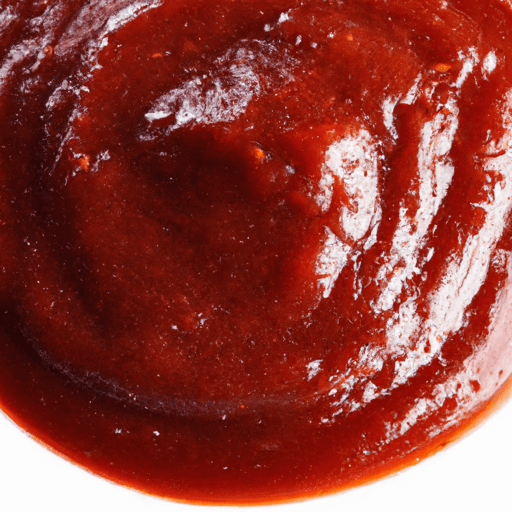Exploring the Magic of Barbecue Sauce
Barbecue sauce, the tangy and flavorful condiment that has captured the hearts (and taste buds) of countless food lovers around the world. Whether you’re grilling outdoors, slow-cooking in the oven, or spicing up your dishes indoors, barbecue sauce adds that extra punch of flavor that brings your culinary creations to life. In this article, we’ll dive into the delightful world of barbecue sauce, exploring its taste, common uses, nutritional value, and uncover a few interesting facts and history along the way.
The Taste that Sets Fires Alight
One of the most appealing aspects of barbecue sauce is its diverse and complex flavor profile. It’s a harmonious balance of sweet, tangy, smoky, and spicy that can vary from region to region. The sweetness typically comes from ingredients like brown sugar, molasses, or honey, while the tanginess is derived from vinegar or citrus juices. The smoky notes are often achieved through the use of ingredients such as liquid smoke or smoked spices, providing that characteristic barbecue essence. As for the spiciness, it can range from mild to fiery, depending on the recipe and personal preferences. Together, these flavors create a symphony of taste that enhances foods, making them irresistible.
Versatility at its Finest
Barbecue sauce’s charm lies not only in its delightful taste but also in its versatility. It can be employed in an array of dishes, taking them from ordinary to extraordinary. While commonly associated with grilled meats like ribs, chicken, and brisket, barbecue sauce extends far beyond. It adds a delightful coating to oven-baked chicken wings, a lip-smacking glaze to salmon, and a zesty kick to grilled vegetables. Not to mention its role in creating delicious pulled pork sandwiches and finger-licking barbecue meatballs. The possibilities are endless, and the tangy allure of barbecue sauce knows no bounds.
Nutritional Value
While barbecue sauce entices our taste buds, it’s essential to consider its nutritional value. The classic recipe typically includes ingredients that offer essential vitamins and minerals, such as tomatoes, garlic, onions, and a plethora of aromatic herbs and spices. However, it’s crucial to choose wisely and be mindful of sugar and sodium content, as some store-bought varieties may be higher in these areas. For a healthier option, homemade barbecue sauces allow you to control the ingredients and their quantities, letting you strike a better balance between flavor and nutrition.
The History and Fun Facts
A Tangy Timeline
The roots of barbecue sauce trace back to ancient times, finding its origins in various cultures around the world. Native Americans prepared a sauce called “chili” that was made with tomatoes and chili peppers. In the Caribbean, a sauce known as “barbacoa” was embraced, while China had its own version called “hoisin sauce.” However, the modern-day barbecue sauce we know and adore evolved in the United States during the 17th and 18th centuries, as European settlers explored the New World. Over time, distinctive regional styles emerged, from the vinegar-based sauces of the Carolinas to the tomato-based sauces of Kansas City and the molasses-infused flavors of Memphis.
Barbecue Sauce Transcends Boundaries
Just like the diverse range of flavors, barbecue sauce’s popularity knows no boundaries. It has achieved global recognition, with countless variations and adaptations found across continents. In the United States, it even has its own month. May is celebrated as National Barbecue Month, honoring this saucy delight and the joy it brings to our plates. Whether you’re savoring a traditional Kansas City barbecue or enjoying a tangy Korean barbecue dish, the versatility and appeal of barbecue sauce are evident worldwide.
So the next time you fire up the grill or embark on a culinary adventure in your kitchen, don’t forget to reach for that bottle of barbecue sauce. Its delightful taste, endless possibilities, and rich history make it an essential and enticing addition to any kitchen. The marriage of sweetness, tanginess, smokiness, and spice transforms your dishes into unforgettable creations. Embrace the magic, explore the flavors, and let the tangy allure of barbecue sauce lead the way.
Note: It’s always exciting to experiment with different barbecue sauce recipes and variations. Don’t hesitate to create your own signature blend, tailored to suit your personal preferences and wow your taste buds.
Origin and History
- Barbecue sauce is believed to have originated in the Caribbean and eventually made its way to the southern United States.
- It is closely associated with Southern-style barbecue, which has its roots in African and Native American cooking traditions.
- Different regions of the southern US have their own distinct styles of barbecue sauce.
Common Uses
- Barbecue sauce is typically used as a flavor enhancer, condiment, or marinade for grilled or smoked meats, such as ribs, chicken, pork, and beef.
- It can be used as a dipping sauce, glaze, or basting sauce.
Nutritional Benefits
- The nutritional content of barbecue sauce can vary depending on the brand and recipe, but most commonly it contains tomatoes, vinegar, sweeteners, and spices.
- It is a source of vitamins and minerals, including antioxidants like lycopene found in tomatoes.
Unique Properties
- Barbecue sauce often has a combination of sweet, tangy, and smoky flavors, depending on the recipe.
- It can range in consistency from thin and runny to thick and sticky, depending on personal preference and regional styles.
- Some barbecue sauces contain ingredients like molasses, brown sugar, honey, or fruit juices to add sweetness, while others may incorporate mustard or vinegar for a tangy or tart flavor.
Historical Significance
- Barbecue sauce has played a significant role in many cultural and historical events in the United States, particularly in the South.
- It has been used in large barbecue competitions and gatherings, where participants showcase their unique sauce recipes.
- Barbecue sauce has become an iconic part of American cuisine and is enjoyed by people around the world.




Use the share button below if you liked it.
It makes me smile, when I see it.